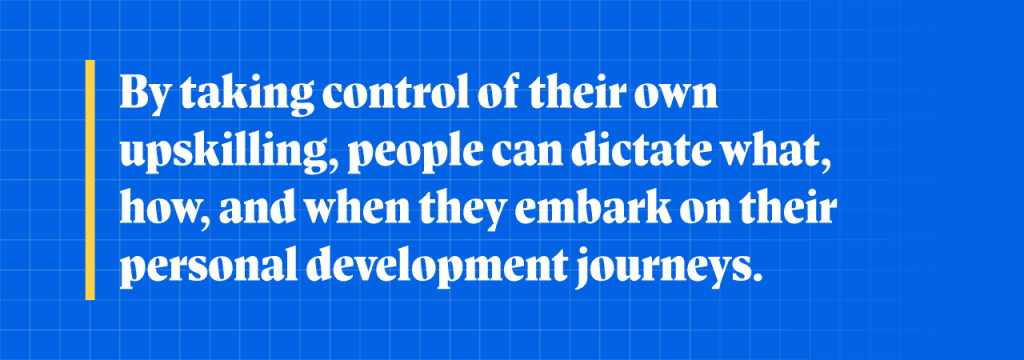In any business, leaders have lots of responsibilities. And the list will continue to grow as their organizations come to terms with fundamental changes that include hybrid working, automation, and digital transformation. New skills are required — and that’s why forward-thinking companies are shifting their focus to upskilling leadership, existing and future.
It takes many skills to be a great leader, and those skills evolve as a business, team, and market change. Unfortunately, many organizations haven’t kept pace in consistently upskilling leadership. In Australia, more than 72% of workers who left their jobs in 2019 cited poor leadership as their main reason. Managers, overall, ranked as ‘average’ in the eyes of many Australians, scoring just 5.6 out of 10 when rated on their performance and skills.
The Evolution of Leadership
Leadership is as old as human civilization. As people began forming groups, leaders emerged to establish order, provide direction, and help groups meet goals (with survival as a top priority).
Fast-forward to the modern era, to the emergence of what we recognize as traditional leadership. In 1905, Max Weber’s bureaucratic management theory said it’s essential to have clear lines of authority, rules, and procedures in each business operation. Frederick Taylor in 1909 presented his scientific management theory, which focused on worker output and said that if tasks were optimized and simplified, productivity would increase. Workers’ main motivation under this model was that they remained employed. And in 1916, Henri Fayol formed what became known as administrative theory, which looked at how efficiently management was organized and processes standardized. He also created the 14 principles of management.
Together, these theories were building blocks for many of the management practices used today.
Leadership Today
Today, leaders are required to navigate significant organizational and social realities that exceed any challenges early business leaders could have imagined.
For example, leadership must anticipate and address disruptions to take advantage of new opportunities created by digitization and automation.
Simultaneously, there’s an increased demand for empathetic leadership styles that understand people perform best when all of their needs and concerns are taken care of. Managers are increasingly asked to consider work-life balance, family and other commitments, and the fears or concerns of their people. Indeed, research has shown that managerial support is critical in supporting people as they deal with stress and health issues.
New Leadership Skills
New expectations require a new set of skills. The most important behaviors that workers want from their leadership are authenticity, trustworthiness, and inspiration. Therefore, many of the skills that modern-day leaders need are human skills. Upskilling leadership in human skills can inspire, set direction, build trust, and foster teamwork.

“Leaders need to turn up and give confidence that they are working on [an issue],” said David Thodey, former CEO of Telstra and Chair of the Commonwealth Scientific and Industrial Research Organization. “And you need to bring in processes around the collection of data to create a single source of the truth. You need to be open and transparent, but you also need to be flexible, because sometimes you will see you made a decision where something isn’t quite right and need to be willing to say, ‘We got that wrong,’ and move on.”
What skills should be on the list?
1. Emotional intelligence
Upskilling leadership in emotional intelligence and empathy is critical. Stress, anxiety, and depression rose by 21% in 2020 among workers in Australia. And managers are increasingly supporting the mental wellbeing of their people.
2. Effective communication
Transparent and open communication can help to alleviate people’s concerns and build trust between leaders and their workers. Many CEOs now communicate with their teams multiple times a week — to respond quickly to changes, communicate their thoughts, and address suggestions.
3. Agility
The ability to effectively respond to change is another key skill. When the COVID-19 pandemic hit, only 12% of organizations reported having continuity plans that prepared them for it. Many leaders scrambled to adjust their business strategies. As a result, leaders are now watching more closely for new opportunities and unexpected challenges.
4. Resilience
In the wake of COVID-19, resilience skills rose in importance by 34% (up from 13% pre-Covid) among surveyed workers. This makes sense when you consider that leaders are expected to be a calming force
How to Build Leadership Skills
Knowing what skills are needed is one thing, but building them is a whole different challenge. Human skills cannot be taught in a classroom.
Tailor development to each individual.
Successful organizations empower their current and future leaders to own their upskilling. By taking control of their own upskilling, people can dictate what, how, and when they embark on their personal development journeys.

OceanaGold emphasizes enabling leaders at every level to achieve sustainable results and help their teams thrive.
“We recognized that leadership needs to be values-driven, constructive, and capable,” said Karlie Webster, Group Manager for Organizational Culture and Development. “To achieve this, our leaders require a strong achievement orientation (focus on delivering high-quality results) with a humanistic, encouraging approach (supporting the growth and development of people) that filters throughout our culture. A bespoke, interactive training series takes our leaders through all the key elements needed for great leadership — 95% of our 400 leaders completed the first round of this within three weeks.”
Offer formal and informal learning.
Providing a range of learning opportunities can tailor leadership training to different interests, learning styles, and needs. Leaders are exceptionally busy, so learning delivered in bite-size content can greatly increase engagement and completion. A book, a podcast, a TED Talk, and everything in between can help leaders build much-needed skills.
At the international spirits company Edrington, learning leaders shifted a one- and two-day leadership training program to a virtual, modular program that delivers training over three to four weeks. Now, upskilling opportunities are delivered at a time and pace that suits each individual, making them more accessible to global employees and those who otherwise couldn’t attend training days. It’s also reinforcing newly learned skills. Because people are learning over a longer period of time, they’re more likely to remember and apply their learning.
Turn to peers.
Peer-led learning, coaching, and mentoring are important ingredients for upskilling leadership. People (55%) often turn to their peers to learn new skills. Shadowing a senior leader can be inspiring. And access to a coach or mentor can help aspiring leaders learn what it takes to be in charge. (And mentoring others can help people build valuable communication skills.) In addition, stretch assignments can give people their first chance to manage a team.
Final Tips
Tracking what people learn throughout an upskilling leadership journey is important. Setting clear goals and skill requirements for their next career steps provides incentives to complete leadership training. It also provides direction.
People need the opportunity to practice their new skills at work through experiential learning like secondments, stretch assignments, and volunteering. This helps them remember their learning and also hone those skills further.
Make no mistake: strong leadership will be the competitive differentiator for tomorrow’s top organizations. Enabling your people now, by putting learning in their hands and providing training that’s personalized, will pay off with higher engagement, completions, and capabilities.
Want to Learn More?
Take our Upskilling Strategy Audit to receive personalized insights to help build your strategy, or contact a Degreed representative today.
